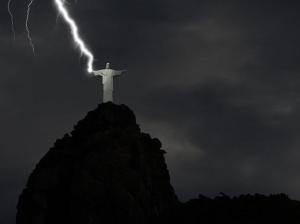 Let’s do it! In his most recent article on Patheos, Matthew Ditsefino admonished his readers to not “let bad Christian theology off the hook.” I totally agree with Matthew. Bad theology is rampant and can lead to bad ethical behavior. Moreover, it can lead people astray to the detriment of their souls. Therefore, we should not let “bad Christian theology” off the hook.
Let’s do it! In his most recent article on Patheos, Matthew Ditsefino admonished his readers to not “let bad Christian theology off the hook.” I totally agree with Matthew. Bad theology is rampant and can lead to bad ethical behavior. Moreover, it can lead people astray to the detriment of their souls. Therefore, we should not let “bad Christian theology” off the hook.
But… what is “bad Christian theology?”
Bad Christian Theology Defined… Kind of
Matthew does not initially define “bad Christian theology.” He does provide examples of people who call themselves “Christians,” but say and do bad things. For example, Greg Locke (never heard of him) and Vladimir Putin (him we all know). One (Locke) is an actual witch hunter and book burner (who knew?) and Putin, as we all know, invaded Ukraine and has caused massive death and destruction. Now, Matthew does not go into a systemic analysis of each man’s personal theology. Each man does bad things that hurt people and therefore misinterpret the word of Jesus (according to Matthew). So, “bad Christian theology” is theology that harms. Conversely, good theology brings life. What kind of life? Matthew does not say.
Anti-Deconstructionist and LGBTQ Opponents
Next, Matthew addresses Christian critics of deconstruction (the deconstruction of traditionally Evangelical Christianity and reconstruction into Progressive Christianity) and those who view homosexual acts as sinful. What I get from this section is that Matthew views those who disagree with his theology as those who also practice “bad Christian theology.” These “critics”also do not speak out against people like Locke (this is an argument from silence, as we have no idea if the “critics” agree or not), so they participate in “bad Christian theology” with their silence.
Matthew’s Definition Fully Defined
Towards the end of the article, Matthew finally offers a semi-theological definition of “bad Christian theology.” He writes:
To that end, all we can do is call out harmful theology when we see it. How do we know if it’s harmful? It brings harm to people’s lives. It brings the opposite of what Paul called the fruit of the Spirit. Instead of love, joy, peace, forbearance, kindness, goodness, faithfulness, gentleness and self-control, it brings hate, fear, war, shame, and death.
The fruit of the Spirt comes from Galatians 5:22-23. I do have a question for Matthew on this reading of Galatians. Does this reading fit the context of Galatians chapter five? Is Matthew guilty himself of doing “bad Christian theology?” I think so…
Deconstructing Bad Christian Theology
If we look at the context of Galatians chapter five, we see that St. Paul uses the fruit of the Spirt to counter an earlier list of the works of the flesh. We see this in verses 19-21.
Now the works of the flesh are evident: sexual immorality, impurity, sensuality, idolatry, sorcery, enmity, strife, jealousy, fits of anger, rivalries, dissensions, divisions, envy, drunkenness, orgies, and things like these. I warn you, as I warned you before, that those who do such things will not inherit the kingdom of God.
St. Paul here juxtaposes the works of the flesh and the fruit of the Spirit in Galatians chapter five. St. Paul does not juxtapose “good Christian theology” and “bad Christian theology.” True, the works of the flesh stand in opposition to the fruit of the Spirit, but the use here connects to St. Paul’s warning in verse 21 that those who “do such things will not inherit the kingdom of God.” Those who practice the fruit of the Spirit and flee the works of the flesh belong to Christ and will inherit the kingdom of God. St. Paul confirms this in verses 24 and 25.
And those who belong to Christ Jesus have crucified the flesh with its passions and desires.
If we live by the Spirit, let us also keep in step with the Spirit.
Furthermore, St. Paul’s list of sexual sins “and things like these” include homosexual acts, so according to Matthew’s definition of “bad Christian theology, St. Paul too is guilty. I mean, he does not agree with Matthew on sexual sins (Romans 1:26–27), so his views are harmful and therefore bad.
Truly Bad Christian Theology
In conclusion, Matthew Ditsefino’s uses “bad Christian theology” to point out the “bad Christian theology” of others. Now, I cannot comment on whether those who Matthew criticizes hold to “bad Christian theology” or not using Matthew’s faulty method. As a Roman Catholic, I agree that “bad Christian theology” exist within the Russian Orthodox and Protestant Evangelical traditions. I also hold that people like Locke and Putin act contrary to those traditions. This does not mean that their respective traditions have “bad Christian theology.” It means that to act contrary to one’s tradition does not then make that tradition “bad.” That person is bad, not the tradition their action go against.
A more honest approach from Matthew would be to state upfront that all “bad Christian theology” is any theology he disagrees with. We can then work from that definition and analyze his theological positions to determine what is and is not “bad Christian theology” or what is or is not actual Christian theology in the first place.
I welcome any feedback from Matthew. Let’s have a productive dialogue.
Like what you read? Please check out my other writing here.
Please like and follow me on Facebook.












